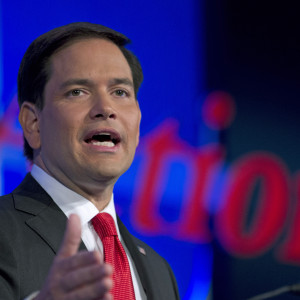Florida Sen. Marco Rubio became the latest 2016 GOP presidential candidate to cater to the on-demand economy Tuesday, calling for fewer regulations for companies like Uber and Airbnb during a policy speech in New York.
“The on-demand platform is one example of an important truth facing us in this election, which is that the American economy is fundamentally transforming,” Rubio told the Civic Hall in New York. “Uber didn’t even exist when our current president was sworn in. Today it’s worth $51 billion.”
Rubio started the speech with a story about his home refrigerator in Miami breaking last summer, and the three days it took for him to hire someone to fix it.
“That just can’t be how our economy works in the year 2015,” he said. “Other things that took three days in the old economy now take three minutes – or three seconds. What struck me in that moment was the following realization: Inevitably, somewhere not far from me, there was someone capable of repairing appliances who was just as eager to make some extra money that day as I was to have a functional refrigerator. The only problem was that this person and I had no way of finding each other.”
The Florida senator said that problem would be solved in a year or two (companies like Yelp, Angie’s List and Thumbtack already operate in that vein), and in areas like transportation and travel, companies like Uber and Airbnb have already found solutions and generated no small amount of economic disruption for longstanding market players like the taxi and hotel industries.
As a result, the sharing economy has faced a number of regulatory hiccups in recent years as regulators and established industries try to grapple with the new competition, including in New York City, where Mayor Bill de Blasio abandoned a plan to limit the number of Uber drivers in the city, and in California, where the ridesharing service lost a court battle over whether its drivers should be treated as employees or contractors.
“The American people have chosen an economy in which the most valuable retailer in America, Amazon, owns not a single store; the largest transportation company, Uber, owns not a single vehicle; and the largest accommodation provider, Airbnb, owns not a single hotel,” Rubio said.
RELATED: Startups Look to 2016 Debate for Policies Boosting Innovation Economy
“The on-demand economy is a miracle that only American free enterprise could produce,” he continued. “That’s why it’s so shameful that the biggest obstacle to the growth of this platform is our very own government.”
Rubio said hurdles including an “antiquated tax code, burdensome regulations, and numerous outdated politicians” threaten to stifle the most crucial sector of the future U.S. economy.
That future includes startups like Handy, a platform for finding contractors to take on jobs like Rubio’s fridge repair, which now operates in 37 cities and employs 11,000 contractors at an average of $18 an hour. As contractors, workers can choose their own hours.
Such freedom allows Americans to seek higher education and increases upward mobility, Rubio added before defending Handy, Uber and others’ ability to hire workers as contractors instead of employees, freeing them from the obligation to provide costly benefits like health insurance.
“If Handy’s CEO, Oisin [Hanrahan], classifies the workers as W2 employees, then much of the flexibility that makes working with Handy so appealing would disappear,” Rubio explained. “He’d have to regulate workers’ hours and comply with a litany of expensive requirements that would stunt the growth of his company.”
However, Rubio also pointed out 1099 independent contractor requirements prevent Handy from establishing minimum standards for service and appearance, or from providing “perks and benefits” to attract “high-quality professionals.”
“Think about how ironic that is,” Rubio said. “Our outdated politicians bash the on-demand economy for not taking better care of workers, yet our outdated government is the exact force preventing it from doing so.”
As president, Rubio said he would tackle those issues by supporting a tax-free Internet, setting a cap on the cost of regulations annually and conducting analyses on how new regulations would impact “competition and innovation.”
Rubio said other countries are already ahead of the U.S. in establishing a framework for the the sharing economy, including Germany, where businesses can hire workers as “dependent contractors” — a designation between employee and independent contractors, allowing workers to stay with a single company, receive benefits, protections and maintain control of their schedules.
Rubio also put in a shot against those hinting at forthcoming regulations for the on-demand model, including Federal Trade Commission Chairman Edith Ramirez, who last week suggested “targeted regulatory measures” for startups, and fellow 2016 presidential hopeful Hillary Clinton, who said in July the “gig economy” is “raising hard questions about workplace protections and what a good job will look like in the future.”
“Right now, [regulators] recognize that the new economy doesn’t fit our current tax code and our current way of doing things, so they ask themselves: How can we force the new economy to adapt to our old policies?” Rubio said. “I’d rather ask: How can we change our old policies to adapt to the new economy?”

